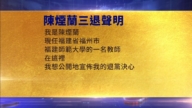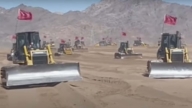【新唐人2013年05月20日讯】新一届中共中央的政治与经济路线,可能在十八届三中全会上提出。三中全会预计在今年的下半年召开。据透露,中共高层正在起草七大领域的改革方案,将提交十八届三中全会审议,通过后,将在明年初开始在多个层面展开。不过,外界注意到,这次七大改革并没有涉及国有企业改革,也没有迹象显示,中共高层将启动政治体制改革。
据报导,中共中央已成立7个独立小组,起草涵盖金融部门、财政体系、土地使用权、生产要素价格、简化行政审批程序、社会收入不公,与户籍制度等领域的改革方案。而中共总书记习近平亲自主持统筹。
习近平“十八大”接班后,多次强调“党管经济”。他在首度南巡时,在广州召开经济座谈会;4月25号,中央政治局常委会也开会,专题研究经济工作。
报导指称,七大改革方案,主要是想从日益令人忧虑的贪腐、过度投资及地方债务的风险中,企图获得生机。政论家伍凡表示,目前,中国社会矛盾太多,当局就想用些许的改革来纾解矛盾。
香港《明报》报导,国家统计局原副局长贺铿认为,目前当务之急是收入分配和财政体系改革。他指出,中国收入不公位处世界前列,不仅引起内需不足,而且引起许多社会矛盾,前年全国人大曾就此进行调研和建议,国务院去年也提出过改革方案,但,贺铿说,收入不公牵涉许多利益集团,改革需有魄力,才可突破利益格局。
政论家伍凡:“那么,你的改革要涉及到多方面的利益,改革经济、改革工资,或者改革就业,改革发展模式,都牵涉到很多人的利益,牵涉到很多官员的利益,他们都愿意放弃吗﹖他不愿意放弃!”
《关于深化收入分配制度改革的若干意见》在今年2月发布,但具体政策却有待制定。
政论家伍凡:“金融本身,你把钱都贷给那些大财团、大公司,而真正需要钱的那些民营小企业你不给他。你越不借给这些能够创造财富,能够创造就业率的这些中小型企业,他们就去找地下钱庄去找钱,你又去打压地下钱庄,你这个金融政策和金融系统,完全走到了为大财团服务。这个问题不解决,所有的经济改革都是空的。”
在简化行政审批程序的改革方面,国务院已取消和下放117项行政审批项目,包括把部分电力、煤矿和油气管项目,交由地方核准。
政论家伍凡:“中央把几百条的审批权,一点点的往下放,放到省的一级以后,省一级的批权还是在官员里头,即便放到县一级,还是在共产党的官员手上。他们的审批权首先考虑的是共产党政权的利益,共产党官员的利益,而老百姓又没有发言权,又不能跟你争那个权。所以它的改革,都是表面文章,最后不了了之,改不动!”
外界注意到,这次改革没有涉及国有企业改革。另外,没有迹象显示中共高层将启动政治体制改革。《美国之音》引述分析人士的意见说,这可能是由于庞大利益集团的抵制,而高层未能形成政治共识。
政论家伍凡:“如果没有政治改革的配合的话,几乎是没有多大效果!因为现在中国的社会,最大的瓶颈就是老百姓不相信共产党,共产党所做的任何事情没有公信力,并且没有老百姓参与,老百姓没有任何一个发言权、讨论权,更没有决策权。那么,人家也不会跟你配合,所以你的改革,根本没有办法往前推进。”
“中央财经领导小组”是中共最高财经决策部门,而“中央财经领导小组办公室”简称“中财办”,是财经领导小组的办事机构,属于党务系统。“中财办”主任刘鹤被视为习近平的“财经文胆”,这次七大领域的改革方案,由刘鹤领衔起草工作。
采访/常春 编辑/周平 后制/陈建铭
Seven New Reforms Exclude China’s Political System and State Owned Enterprises
At the 3rd Plenary Session of the 18th Chinese
Communist Party (CCP) Central Committee, new
economic and political lines are likely to be announced.
The assembly is scheduled to be
held in the latter half of 2013.
Reportedly, the drafting of central reform
plans are under way, involving seven areas.
The scheme will be presented to the
3rd Plenary Session for approval.
If passed, the plans will be launched early in 2014.
Political observers indicate that the seven reforms
plan does not cover state-owned enterprises (SOE).
There are no signs that the CCP top leadership
is planning to reform the political system.
Reportedly, the CCP Central Committee has
set up seven independent steering panels.
These leading groups take the lead in
drafting reform schemes, for seven areas.
These include the financial sector, fiscal system,
land use rights, pricing of factors of production,
simplification of administrative approval procedures,
income injustice, and household registration system.
CCP leader Xi Jinping is reported to have taken the helm.
After assuming office, Xi has repeatedly
emphasized CCP control over the economy.
In his first southern tour in Guangzhou,
he held an economic forum.
In April, the CCP Politburo Standing Committee
members were convened to discuss economy.
Media reviewed that these seven reform plans aim
to get out of the current difficulty, to revitalize China.
The current plight includes growing corruption,
excessive investment, and risks from local debts.
Critic Wu Fan has remarked that China
has by far been riddled with social conflicts.
It thus drove the CCP authorities to initiate reforms.
Hong Kong’s Ming Pao newspaper quoted He Keng,
former deputy chief of China’s State Statistics Bureau.
He said that the current priority is the reform
of income distribution, and the financial system.
He stated that China’s income inequality has
been ranked at being at the forefront globally.
The problem has caused insufficient domestic
demand, and triggered massive social conflicts.
In 2011, China’s National People’s Congress conducted
surveys and presented suggestions on this issue.
In 2012, the State Council put forth a relevant reform plan.
However, He Keng indicated that income
inequality has involved many interest groups.
Courage and resolution is needed in carrying out the reforms.
This can help break through restrictions
put in place by interest groups.
Wu Fan, critic: “The CCP’s reform will
involve a wide range of interest groups.
The reforms involve the economy, salaries,
employment, or modes of economic development.
This will affect interests of lots of people, including officials.
Will they be willing to give up their interests? They won’t!”
In February, the CCP authorities issued an official opinion
on the deeper reformation of the income distribution system.
However, concrete policies are yet to be offered.
Wu Fan: “Financially, the state banks have always
provided loans to consortia and large SOEs.
They have rejected lending to those in-need
private enterprises which would really make wealth, and boost employment.
The bank rejection has forced the private
enterprises to repeatedly seek underground loans.
Furthermore, the authorities
combat these underground banks.
As a result, China’s financial policies and system
have fully played a role that serve the consortia.
If this problem can’t be solved, all
other economic reforms are fake.”
In simplifying the administrative approval procedures,
the State Council has cancelled and decentralized
administrative approval to local authorities on 117 projects.
These include some projects on electricity,
coal mines, as well as oil and gas pipelines.
Wu Fan: “These approval powers will be decentralized
from the central authorities to the provincial level.
But even it is passed down to the county
level, it is still in the hands of CCP officials.
For them, the first thing to consider for any approval
is to ensure the interests of the CCP, and its officials.
Chinese civilians have no right of speech,
nor can they fight over power with the CCP.
So after all, its reforms are just surface formalities and
come to nothing, for it can’t actually change anything.”
Political observers have reviewed that this
reform plan does not cover the reform of SOE’s.
Besides, there are no signs that CCP top leaders
have prepared to reform the political system.
Voice of America quoted some analysts.
It said that this may be due to a boycott from
large interest groups, whilst CCP top levels
haven’t yet reached a political consensus.
Wu Fan: “Without a synchronization of political
reform, these reforms will produce little result.
Currently, the biggest bottleneck in
China is the public’s distrust of the CCP.
It has lost credibility in everything it undertakes,
and no ordinary people are willing to participate.
The masses have no right of speech, nor discussion,
and neither do they have decision-making powers.
So its reform won’t be truly followed
in the implementation process.”
The central financial steering panel is the top CCP
authorities with financial decision-making policies.
The steering panel’s office is an intra-Party organ.
Liu He, the office director, has been
referred to as Xi Jinping’s speechwriter.
Liu is reportedly heading the
drafting of seven-area reform plans.





























